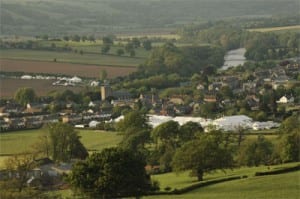Bill’s Hay Festival blog
By news editor, on 8 June 2012
![]() Professor Bill McGuire, UCL Earth Sciences
Professor Bill McGuire, UCL Earth Sciences
 Literary festivals are always fantastic experiences; brimful of excitement, debate, discussion and the simple fun of meeting and interacting with a remarkable diversity of movers, shakers and shapers of society and culture.
Literary festivals are always fantastic experiences; brimful of excitement, debate, discussion and the simple fun of meeting and interacting with a remarkable diversity of movers, shakers and shapers of society and culture.
The Hay Festival is unquestionably right at the top of the pile and looking down the list of a thousand or so participants, it quickly becomes apparent that it’s not so much a question of who is here but who is not.
An eclectic mix
Where else can you – as I did during my visit – chat with crime writer Ian Rankin in the afternoon, joke with Winnie the Witch children’s author – Korky Paul – over dinner, and have breakfast with 2007 Turner Prize winner Mark Wallinger?
Fun as this all was, however, I did have a job to do, and was down to speak at lunchtime about my new book: Waking the Giant: How a Changing Climate Triggers Earthquakes, Tsunamis and Volcanoes.
Beeching’s legacy
This entailed rising at six in the morning on Jubilee Holiday Tuesday – not ideal circumstances following the previous night’s village street party – and taking a couple of deserted trains from Derby to Hereford. Thanks to ‘slasher’ Beeching’s draconian cuts to the rail network in the 1960s, this is now – at 17 miles distant – the nearest trains get to the host town of Hay-on-Wye.
A chauffeured top-spec Range Rover was waiting to transport me the rest of the way; very comfortable but not really a good idea from a carbon emissions viewpoint. Maybe the festival organisers need to take a closer look at its green credentials?
Fully caffeinated
Festivals invariably involve a lot of hanging about before a talk, but fortunately Hay has a great Green Room to keep contributors happy, with never-ending supplies of tea and coffee and something stronger for those who need or want it – and plenty of cake to keep blood sugar levels high.
A quick check over my talk, a chat with my Oxford University Press publicist – Kate Farquhar Thomson – and I was pretty much ready to go. My talk was being chaired by Rosie Boycott, who really should need no introduction; pioneering feminist and co-founder of Spare Rib and former editor of Esquire, the Independent and Independent on Sunday.
We met beforehand to work out how we would manage the event and agreed on 40 minutes for my presentation followed by 20 minutes for questions – and we were off.
It was very gratifying to see a full house – maybe 500 or so people – in the venue; the Sky Arts Studio. This is really just a big tent, but with all the latest high-tech gizmos and set out and lit like a stage. The problem with the lighting is that while the audience has a fantastic view of me, I can barely see them at all, so it feels a bit as if you are talking into the mouth of a dark, empty cave. Notwithstanding this, as long as I managed to get the basic message of the book across, that was the important thing.
The Earth’s revenge
Essentially, this is that we now have a huge and building mass of evidence for rapid climate change, eliciting a dramatic and potentially hazardous response from the solid Earth; in the form of earthquakes, landslides, tsunamis and volcanic eruptions.
Much of this comes from the extraordinary metamorphosis that our world underwent over the past 20,000 years as it flipped from a frigid wasteland to the broadly clement world we know today. This period saw the disappearance of the great northern hemisphere continental ice sheets and a 130m rise in global sea levels, as a staggering 52 million cubic kilometres of water was shifted around the planet.
The consequences included Lapland being rocked by massive earthquakes, an astonishing volcanic outburst in Iceland and a huge tsunami battering the coastlines of Scotland; as well as an increase in volcanic rumblings and seismic shakings right across the planet.
Don’t have nightmares
With ice melting and permafrost thawing already promoting a rise in earthquake activity in Alaska and the formation of more giant landslides in mountainous parts of the world, I left the audience pondering the idea that to the coming climate chaos we might also need to add geological havoc.
The talk was very well received and the following questions – as ever at these sorts of events – were astute and relevant. Somewhat surprisingly, the crowd appeared to be devoid of climate change deniers; either this or they were keeping their heads down on this occasion.
Extraordinary interactions
An hour soon passed and it seemed no time at all before the audience was decanting prior to the next event; a bit depressed – I have no doubt – about the world our children and grandchildren look like inheriting, but also – I hope – informed and fascinated about the extraordinarily complex manner in which the different elements of our planet interweave and interact.
Bill McGuire is Professor of Geophysical & Climate Hazards, UCL Earth Sciences
Image: The Hay Festival site (Credit: Finn Beales)
 Close
Close

